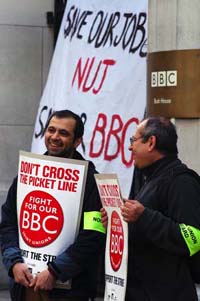 It's a beautiful morning in Brighton. The first thing I noticed as I woke up was the sun on the ash tree outside my bedroom window.
It's a beautiful morning in Brighton. The first thing I noticed as I woke up was the sun on the ash tree outside my bedroom window.The second thing I noticed was that there was something wrong with my radio alarm. 'Just a minute' repeats on Radio 4 at 7.50am? It can only mean one thing - strikes at the BBC.
Just in case you've been living in a cave for the past few months, BBC director general Mark Thompson has proposed to cut 3,780 jobs - nearly one-fifth of the workforce.
Mr Thompson's three-year efficiency drive will generate an extra £355 million annually, partly by cutting staff numbers through a combination of compulsory redundancy, voluntary redundancy and staff turnover. The aim is to put more money into original programming and to keep up with developments in new technology.
But how - I have to ask - can the BBC operate properly without one-fifth of its staff?
With 58 less jobs, how can the new media department possibly help the BBC keep in step with technological advances? Putting cash in will help, but who will be there to do the work?
Providing timely and comprehensive online coverage is one thing, but the BBC's strength is also in its creativity and innovation. I don't doubt that will be the first thing to suffer in a cost-cutting, super-efficient organisation. And without the exceptional standards set by the BBC for online news, our industry will stagnate.
"Efficiency cuts the grass of the mind to its root," somebody once told me, which may or may not be a quote by Virginia Woolf.
The rampant meadows of the BBC might need trimming a bit, but do be careful with that scythe Mr Thompson.
Comments? Email me.
Help fight for the BBC
• Write to your MP - find their details at http://www.locata.co.uk/commons
• Email Mark Thompson - mark.thompson@bbc.co.uk
• Template letters and addresses are available on the National Union of Journalists website - http://www.nuj.org.uk
Comments
From Chris Youett, 11:38 25 May 2005
The BBC staff and the 'big name' presenters deserve our thanks for coming out to fight for the traditional standards of journalism that has made Auntie respected throughout the world.
When the Thompson Plan was first announced, the suits said the savings would be invested in more programmes made north of Watford. Now the truth is out: the real aim is to slash all resources by between 10 and 25 per cent so that producers have no choice but to commission large amounts of programming from the private sector.
News will be a major casualty with most newsdesks downsized by 15 per cent. This will reduce BBC news gathering to little better than we see in the average free sheet. We are already seeing the damage done to the reputation of many traditional newspapers due to greedy publishers leaving loads of desks empty permanently. This is the main reason why circulations are falling.
In the 1970s, the late John Kent used to produce a superb cartoon series for the Guardian featuring a naive girl. His strips on attempts by the private sector to destroy the BBC have come home to roost. I can still see the strip where various media barons openly admit to Whitehall that they couldn't do programmes as good as the BBC's - and Lew Grade of ATV saying there would be a greater choice of dross like 'Son of Sooty' and 'Double your pap'.
From Jemima Kiss, 11:52, 25 May 2005
Someone I spoke to recently said that they reckoned Mark Thompson had a revised, lower number of job cuts on offer but was keeping it under the desk for now. I hope that's true.
I just don't get the explanation that to create a more agile BBC that is more responsive to changing technology and new platforms, they need less staff. Wouldn't that need more staff, if anything?
The debate about computers doing the work of journalists died quite some time ago - I think we all know we still need reporting and creativity at the beginning of the process.
Free daily newsletter
If you like our news and feature articles, you can sign up to receive our free daily (Mon-Fri) email newsletter (mobile friendly).
Related articles
- 'Lords review of media is in danger of achieving nothing'
- 'None of the papers have grasped the fundamental difference between the internet and print'
- 'Journalists are too often reduced to a cross between call-centre workers and data processors'
- 'UK offline media is one of the most competitive and creative in the world. You have to ask why that hasn't followed online'
- '40,000 citizen journalists working to report one story for your paper? It's possible, we did it'









